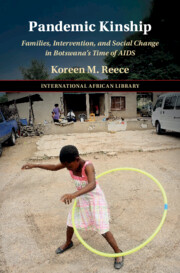In reflecting on ‘housing activities’ and the emplacement of sentiment, Klaits offers a pithy explication of the double meaning implicit in the greeting ‘Le kae?’ or ‘O kae?’ (lit. Where are you?): ‘where you are affects how you are, both in terms of your relationships to others, and … your physical well-being’ (Klaits Reference Klaits2010: 120, emphasis in original). To this observation, I would add that the questions that often follow and that head this Part – O tswa kae?, O ya kae? (Where are you from?, Where are you going?) – not only suggest the Tswana proclivity for constant movement, but are also a sort of shorthand assessment of relationships to home and family, and of progress in making-for-oneself, of which stayings and movements are emblematic. Both are subject to constant negotiation and significant uncertainty, and both perpetually produce dikgang – the management of which involves striking the right balance between closeness and distance, mobility and presence, scatteredness and integration, delimiting and ensuring both the coherence of intergenerational relationships over time and the possibility of independent personhood in the process.
AIDS – an epidemic in which movement, closeness, and distance have taken on pathological dimensions – might be understood as just this sort of kgang, suggesting that long-standing practices of managing space among kin might be better suited to dealing with the epidemic than popularly assumed. However, to the extent that government and non-governmental responses to the epidemic have misread the dangers in kinship spatialities – and have introduced new spatial logics and practices that invert and transgress them, on new timelines – their coping potential has been unintentionally undermined.
Of course, the ways in which families and intervening agencies manage space over time are not the only ways in which they negotiate their relationships. As Dipuo’s example suggests, the work one is doing and the things one is contributing or withholding, in the places in which one stays and among which one moves, have similarly fraught and contradictory implications for both kinship and personhood. In Part II, I examine Tswana practices and understandings of care in terms of contribution, the dikgang they generate, their implications for kinship and self-making, and the effects on these dynamics of AIDS-era programmes and interventions.
***
INTERLUDE: Ear Wiggle
‘Koreen, mpona,’ insisted Thabo, tugging at my arm. We were both sitting on our heels in the sparse shade of a brambly bush, taking a rest. Around us, the children continued digging, shovelling the loose river sand into buckets and hauling it up to the truck. The sun blazed and the sand was hot on our bare feet; but below its surface it held the cool, moist memory of the river. Frogs exposed by the children’s shovels tried to wriggle deeper into the riverbed or else shook themselves and hopped past us into the deeper shade, granular in their coats of sand.
‘Koreen! Mpona!’ When I finally turned to look at him, Thabo was wearing his characteristically serious expression. It gave him an uncanny air of wisdom for a six-year-old. Still, I couldn’t tell what he wanted me to see.
‘What am I looking at, kgaitsadi?’ I asked. I usually called him ‘brother’, although he found the term a bit dubious and would furrow his eyebrows at me when I did.
‘Look!’ he repeated, impatiently, turning his head sideways just a notch. I realised his ears were moving, wiggling back and forth. He kept his face still but watched me carefully from the corner of his eye, waiting for a reaction.
I laughed with delight and pointed at his ears, unsure how to say ‘wiggling’ in Setswana. He cracked a mischievous, satisfied smile in response, still wiggling his ears. ‘Now you watch me!’ I said, doffing my broad hat and wiggling my ears as vigorously as I could.
Thabo’s look changed back to one of total seriousness. He stood up and put his hands on the top of my head and over my eyebrows to make sure I wasn’t cheating by wiggling some other part of my face. He had been showing his siblings this trick for days, and none of them had been able to replicate it. My ears kept wiggling.
Satisfied, Thabo sat back down on his heels and propped his chin on his hands, looking at me thoughtfully. ‘So that’s why I’m your brother,’ he remarked, conclusively.

